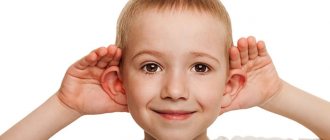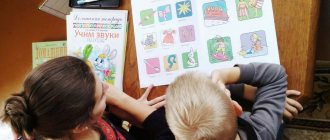Age norms for speech development at 2-3 years
Each age has its own vocabulary, certain pronunciation skills, and the degree of understanding of other people’s speech. So, the baby babbles his first words at the age of about a year. At first they are indistinct, but over time they become more and more clear. By the age of 2-3 years, the basic speech base is already formed, therefore, from birth to 3 years, you need to pay special attention to the development of the baby’s speech.
Speech norms for children 2-3 years old :
- The vocabulary of a 2-year-old child is approximately 200-300 words, and after six months the number of words reaches 1000-1200. More than half are nouns, with verbs in second place. By the age of three, the active use of adjectives, pronouns, adverbs, prepositions and conjunctions begins.
- The child is able to construct simple sentences of 2-3 words, explain what he needs, and communicate with peers. These are mostly declarative or exclamatory sentences. Single words are used as questions: where, how, why.
- The child names the size of the object (large - small), color, taste (sweet - salty - sour), shape (circle - square), quality (bad - good).
- Generalizing words appear in speech. For example, an orange, an apple, a pear are fruits, shoes, slippers, boots are shoes.
- Lightweight words like “bi-bi” and “tu-tu” disappear from speech.
- The baby understands the adult’s address to him.
- Incorrect use of declensions, numbers and genders is possible. By the age of three, their use should correspond to the language norm.
- Children at this age love to invent their own words. Substitutions of letters are possible, syllables in long words are swapped or shortened. For example, a spatula is a shovel, Vaseline is majeline, etc.
- Two-year-old children have difficulty pronouncing hissing sounds, replacing them with whistling sounds. Hard sounds are often replaced by soft ones, and this is normal. Some children already pronounce most sounds by the age of three, even the most complex ones - l, r.
Communication with parents and loved ones is the main source of information for a child. He unconsciously copies those with whom he is close.
Advice At the age of 2-3 years, the child’s attentiveness increases, he begins to listen to the speech of others. Children are very sensitive to the norms of language, so it is important to speak to them correctly: pronounce sounds clearly, do not lisp, use understandable words, take your time, speak with expression.
How to develop speech: games, exercises and communication
The speech development of 2-3 year old children largely depends on how much time parents devote to it.
A few rules to learn before starting classes:
- You need to start communicating with your child as early as possible, even when he is not yet born.
- During games and exercises, you need to look at the baby. Eye contact is a prerequisite for the emotional stability of the baby.
- The child should see how the muscles of mom or dad's face move when they talk to him. This way he will quickly match certain movements with sounds. During classes, it is useful to be in front of a mirror so that you can see all the movements of your face.
- The more repetitions, the better. At a younger age, you will have to repeat it ten or even twenty times so that the baby remembers better. This is normal, so parents need to be patient.
- The clearer, slower and louder the words are spoken, the faster and more accurately the baby will be able to repeat them.
- Any attempt to speak should be encouraged, even the most inept and unintelligible.
- And, of course, you can’t swear if something doesn’t work out. Over time, it will definitely work out, but the child may experience additional difficulties due to excessive emotionality of the parents.
- Classes should be carried out daily, but there is no need to overtire the baby. 10-20 minutes a day, divided into several short lessons, is enough.
- The more you read to your baby, the faster his vocabulary expands. Expressive reading will help you understand complex structures.
- The child's temperament must be taken into account. With high intellectual development, the baby may simply be silent.
Exercises for speech development:
- To expand your vocabulary, it is convenient to study words on general topics: fruits, clothes, animals, toys, etc. The parent clearly names the object and offers to repeat its name. It is useful to include definitions, for example, the ball is green, the cube is yellow. It would be good if additional words would emphasize the belonging of objects to gender or number. This way the child will quickly begin to catch the difference. Example: big doll - big ball, yellow pear - yellow cube.
- First, the parent names the object, and then this role is transferred to the child. You just need to point to an object and ask what it is. Any answer should be encouraged; if the child makes a mistake, then gently correct him.
- Give your child riddles. It's good if the answer rhymes. Examples of riddles: “Igo-go! - the child screams, that means it’s ... (foal).” Or: “Chick-chirp! Don't be timid! I’m an experienced... (sparrow).” Other riddles: “The monkey loves oranges and bananas very much.” “He purrs and sings. Did you guess it? It's a cat)".
- Read simple poems to your child and ask him to complete the phrase. After several readings, he will remember the last words.
- For the little ones: the mother pronounces the first part of the word, and the son or daughter finishes it. This is how words of 2-3 syllables are learned: shop, dog, car, road, etc.
- Let the child determine the diminutive form of the object. For example, an adult asks the question: “What is the name of the cat’s child?” The kid answers: “Kitten.” And so on: puppy, chicken, duckling, baby elephant.
- To develop imagination, it is useful to ask questions such as: why do we need water? spoon? cup? Let the baby dream up.
The most effective are those classes that are conducted in a playful way . The child feels relaxed and is interested in doing fun and active tasks. Games for developing speech for children aged 2-3 years:
- Imitation of sounds of animals, birds, objects. You need to invite the child to depict the simplest sounds: bees, cows, cats, dogs, rooster, steam locomotive, etc.
- Let the baby guess the sound. Play with him like this: portray some animal, and let him guess who or what such a voice belongs to.
- If there are toys in the form of animals in the house, make performances with them.
- A good exercise for the voice: arrange a competition to see who can hold on to the sounds “aaa”, “oooo” and others longer.
- Attention game: place objects on the table and let your child remember them. Then ask him to close his eyes and remove one object. Let him guess what is missing. Start with 2-3 items, gradually increasing their number. You can play the other way around: add a new item and ask the baby to find out what appeared on the table.
- Another game for attentiveness: ask your child to remember what you are wearing, leave the room, add one item (hat, scarf, glasses) and come back. The baby must understand what has changed.
Advice It will be interesting and useful for a child to exchange with parents. Let him take on the main role: ask a riddle, ask a question, hide an object, or change clothes.
Don't ignore the exercise of your tongue and lips . General gymnastics for the development of facial muscles will be useful:
- Pull out your lips with a tube.
- Stretch your mouth into a smile.
- Smile, showing your teeth.
- Let the child just make funny faces in front of the mirror.
Tip If your child cannot give the answer to a riddle, let him think for a while, and then clearly state the correct answer. In time he will remember it.
How to teach a child to talk at 2 years old?
It is not always the case that a small preschooler will agree to study with a specialist every day to improve his development. But he will want to play with his beloved adult with pleasure. This time can be spent not only joyfully, but also usefully.
By selecting a few exercises, you can create a minimum plan for the day. It is important to have several blanks, since a change in the baby’s mood may require a quick reaction to change the material. It is better to alternate sedentary tasks with active ones.
Exercises for the tongue will be favorite and universal, because everyone loves to make faces, and it’s especially fun to do them near the mirror.
Establishing emotional contact
To establish emotional contact, follow the basic rules. Be sure to try:
- conduct classes in a fun, playful way;
- show emotions: smiles, changes in intonation depending on the plot;
- discuss everyday matters, talk about the objects that are around;
- help find synonyms for words, additional descriptions to expand knowledge;
- tell poems, counting rhymes, songs. When the baby learns them, let him finish the lines himself.
Rules for conducting classes
You can conduct classes not only indoors, but also during walks. They are relevant for any age category:
- create eye contact by positioning yourself at the same level as the child;
- The system is important, so every day you need to spend 15 minutes on a lesson;
- For preschool children, the leading type of activity is play. It needs to be emphasized;
- You don’t need to include everything at once in one lesson. Articulation gymnastics and facial massage are needed every day, but it is better to do rhymes and tongue twisters on different days so as not to overload;
- at the age of up to 1.5 years, rhymes need to be spoken actively by articulating, but older ones already perceive normal conversation;
- use different verbs, descriptions and attributes of objects;
- after reading the fairy tale, discuss the characters, describe them;
- On the street, ask your child questions about what is where.
See also:
A child is hysterical at 2 years old - what to do and possible causes










